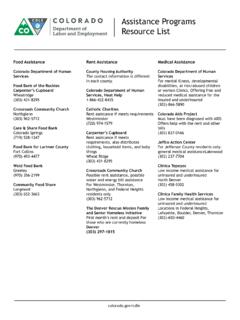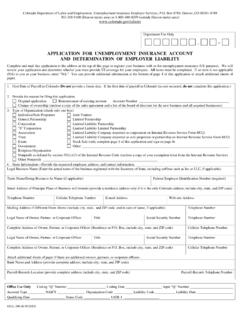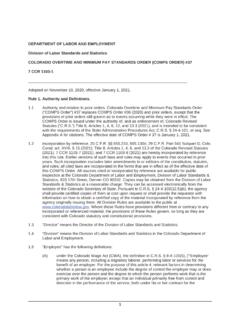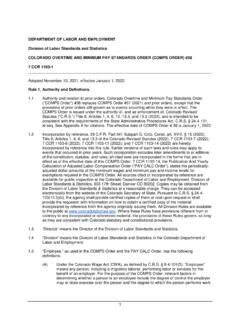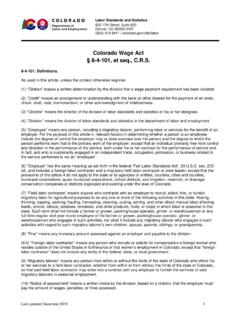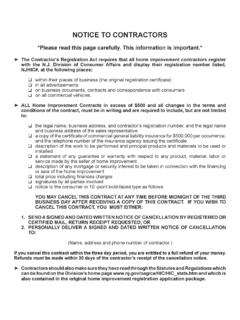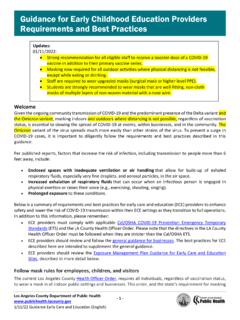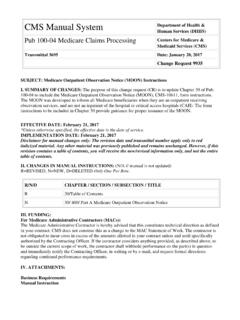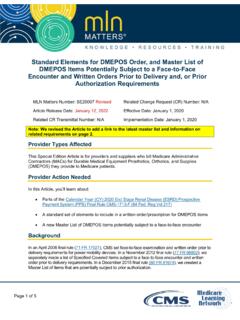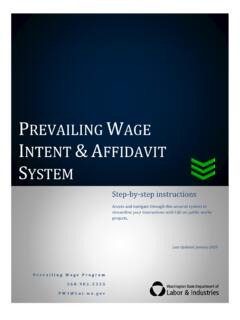Transcription of PA I D L E AV E , W H I S T L E B L O WI N G , & P R O T E ...
1 Colorado Workplace Public Health Rights Poster: Effective January 1, 2021. PAID LEAVE, WHISTLEBLOWING, & PROTECTIVE EQUIPMENT Must be updated annually; new poster Division of Labor Standards & Statistics available 1st week of each December Incremental use. Depending on employer policy, employees can use leave in either hourly or six-minute increments. THE HEALTHY FAMILIES & WORKPLACES ACT ( HFWA ): Paid Leave Rights Employee Privacy. Employers cannot require employees to disclose details about an employee's (or their family's). Coverage: Employers with at least 16 employees are required to provide paid leave under the HFWA HFWA-related health or safety information; such information must be treated as a confidential medical record.
2 Employees earn 1 hour of paid leave per 30 hours worked ( accrued leave ), up to 48 hours a year. Records must be provided upon request. Employers must provide documentation of the current amount of paid leave Up to 80 hours of supplemental leave applies in a public health emergency (PHE), until 4 weeks after the PHE ends. employees have (1) available for use, and (2) already used during the current benefit year, including any supplemental Regular hours and pay set the rate of accrual and compensation for leave, during which benefits continue. PHE leave. Information may be requested once per month or when the need for HFWA leave arises. Up to 48 hours of unused accrued leave carries over for use the next year.
3 For details on specific situations (irregular hours, non-hourly pay, etc.), see Wage Protection Rule , 7 CCR 1103-7. Retaliation or Interference with HFWA Rights Employees can use accrued leave for the following safety or health needs: Paid leave cannot be counted as an absence that may result in firing or another kind of adverse action. An employee can't be required to find a replacement worker or job coverage when taking paid leave. (1) a mental or physical illness, injury, or health condition that prevents work, including diagnosis or preventive care;. (2) domestic abuse, sexual assault, or criminal harassment leading to health, relocation, legal, or other services needs; An employer cannot fire, threaten, or otherwise retaliate against, or interfere with use of leave by, an employee (3) has a family member experiencing a condition described in category (1) or (2); or who: (1) requests or takes HFWA leave; (2) informs or assists another person in exercising HFWA rights; (3) files a (4) in a PHE, a public official closed the workplace, or the school or place of care of the employee's child.
4 HFWA complaint; or (4) cooperates/assists in investigation of a HFWA violation. In a public health emergency (PHE), employees can use supplemental PHE leave for the following needs: If an employee's reasonable, good-faith HFWA complaint, request, or other activity is incorrect, an employer need not agree or grant it, but cannot act against the employee for it. Employees can face consequences for misusing leave. (1) self-isolating or work exclusion due to exposure, symptoms, or diagnosis of the communicable illness in the PHE;. (2) seeking a diagnosis, treatment, or care (including preventive care) of such an illness;. (3) being unable to work due to a health condition that may increase susceptibility to or risk of such an illness; or THE PUBLIC HEALTH EMERGENCY WHISTLEBLOWER LAW ( PHEW ): (4) caring for a child or other family in category (1)-(3), or whose school or child care is unavailable due to the PHE.
5 Worker Rights to Express Workplace Health Concerns & Use Protective Equipment During a PHE, employees still earn up to 48 hours of accrued leave and may use supplemental leave before accrued leave. Coverage: All Employers and Employees, Plus Certain Independent Contractors Employer Policies (Notice; Documentation; Incremental Use; Privacy; and Paid Leave Records) PHEW covers not just employers and employees, but all principals (an employer or a business with at least 5. Written notice and posters. Employers must (1) provide notice to new employees no later than other onboarding independent contractors) and workers (employees or independent contractors at a principal ). documents/policies; and (2) display updated posters, and provide updated notices to current employees, by end of year.
6 Worker Rights to Oppose Workplace Health/Safety Violations During Public Health Emergencies: Notice for foreseeable leave. Employers may adopt reasonable procedures in writing as to how employees should It is unlawful to retaliate against, or interfere with, the following acts during, and related to, a public health emergency: provide notice if they require foreseeable leave, but cannot deny paid leave for noncompliance with such a policy. (1) raising reasonable concerns, including informally, to the principal, other workers, the government, or the public, An employer can require documentation to show that leave was for a qualifying reason only if leave was taken about workplace violations of government health or safety rules, or a significant workplace health or safety threat.
7 For four or more consecutive work days ( days on which an employee would have worked, not calendar days). (2) opposing or testifying, assisting, or participating in an investigation or proceeding about retaliation for, or Documentation is not required to take paid leave, but can be required as soon as an employee can provide it after interference with, the above-listed conduct . returning to work or separating from work (whichever is sooner). No documentation can be required for PHE leave. A principal need not address a worker's PHEW-related concern, but it still cannot fire or take other action against the To document leave for an employee's (or an employee's family member's) health-related need, an employee may worker for that reason, as long as the concern was reasonable and in good-faith.
8 Provide: (1) a document from a health or social services provider if services were received and document can be Workers' Rights to Use Their Own Personal Protective Equipment ( PPE ): obtained in reasonable time and without added expense; otherwise (2) the employee's own writing. A worker must be allowed to voluntarily wear their own PPE (mask, faceguard, gloves, etc.) if the PPE (1) provides To document that an employee (or an employee's family member) required leave for a need related to domestic more protection than equipment provided at the workplace, (2) is recommended by a government health agency abuse, sexual assault, or criminal harassment, an employee may provide: a document or writing under (1) above ( (federal, state, or local), and (3) does not make the worker unable to do the job.)
9 From a provider of legal or shelter services) or (2) above, or a legal document ( , a restraining order or police report). If an employer reasonably deems an employee's documentation deficient, the employer must: (A) notify the COMPLAINT RIGHTS (under both HFWA & PHEW). employee within seven days of either receiving the documentation or the employee's return to work or separation Violations may be reported to the Division as complaints or anonymous tips, or may be filed as in court after exhausting (whichever is sooner), and (B) give the employee at least seven days to cure the deficiency. pre-lawsuit remedies. This Poster summarizes two Colorado workplace public health laws, SB 20-205 (paid leave) and HB 20-1415 (whistleblowing and personal protective equipment).
10 It does not cover other health or safety laws, rules, and orders, including under the federal Occupational Safety and Health Act (OSHA), from the Colorado Department of Public Health and Environment (CDPHE), or from local public health agencies. Contact those agencies for such health and safety information. This poster must be displayed where it is easily accessible to workers, shared with remote workers, provided in languages other than English as needed, and replaced annually. For full versions of these laws, more detailed fact sheets, or questions, information, or complaints as to these or other labor laws, contact: Division of Labor Standards and Statistics, , 303-318-8441 / 888-390-7936.


